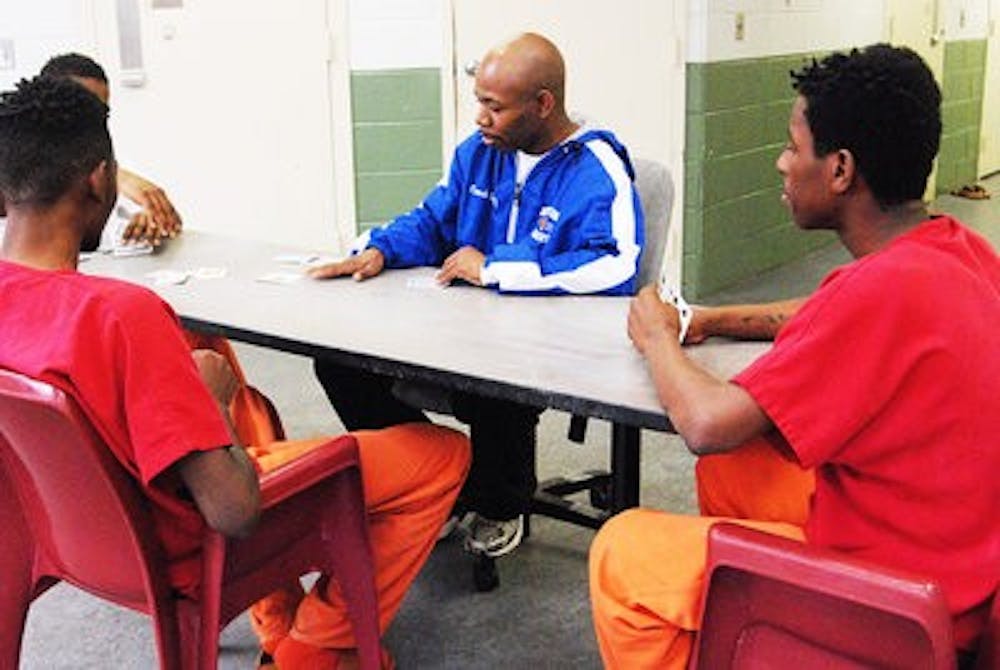On Saturday morning, Oct. 24, 1994, fourth grader Earnest Webb was playing backyard football when he felt extreme thirst and exhaustion.
The 8-year-old went inside, drank two Pepsi's and then slept for six hours. When he awoke at 7 p.m., shaking and ashen-lipped, his parents rushed him to the emergency room where he slipped into a diabetic coma.
Webb remembered waking up attached to tubes and wires. A nurse gave him a painful shot in the stomach--his first dose of insulin.
After receiving his diagnosis, Webb did not fully understand his condition.
"I was craving an orange soda the whole time during the ER," Webb said. "They gave me a Diet Minute Maid Orange, and I'm lookin' like, 'What is a Diet Minute Maid Orange? I want a real orange soda. This is a nasty, nasty soda.'"
Webb, senior in physical activity and health, laughed about his youthful ignorance about Type 1 diabetes.
However, Webb said he wasn't discouraged, even while his siblings enjoyed their Halloween candy the day after coming home from the hospital.
"I said, 'Lord, whatever you have for me I'm going to take it,' and I just went with it," said Webb.
Webb grew up as the fifth child in a family of eight, in the neighborhood of East Park in Auburn. He was the first of his family to attend college and works as an assistant basketball coach at Auburn High School and an assistant football coach at Lanett High School.
Webb also works as a corrections officer at the Lee County Youth Development Center (LCYDC).
When he was a freshman in high school, Webb hit a rebellious streak that put his health at risk.
"When I turned 13 or 14, I started eating whatever I wanted, and I quit pricking my finger," Webb said. "Ninth grade came, and I got kind of crazy, going down the wrong path--smoking, drinking, didn't listen, didn't care."
Coach Frank Tolbert recruited the ninth-grade Webb to be the manager of Auburn High School's basketball team.
At first, Webb was intimidated by Tolbert's disciplined style of coaching and tough love.
"He brought me to his office and said, 'Hey, you need to change,'" Webb said. "He chewed me out. He blistered me, and he blistered me, and he blistered me, and I changed."
Tolbert encouraged Webb to take the Alabama High School Graduation Exam and to continue pursuing his goals through college.
Tolbert held Webb accountable for his mistakes and taught him to be disciplined in taking his insulin and healthy eating.
"Earnest really wants to be a coach," Tolbert said. "The kind of person he is, you don't find those very often--nowadays, you can't find those kinds of kids."
After many years coaching together, Tolbert said Webb is like a son to him.
"He not only saw potential in me, but saw how I could benefit from this community and also benefit the people around this community," Webb said.
The principles he learned from Tolbert carried over to helping troubled youth at the LCYDC as a corrections officer.
Webb said he passes time getting to know the children by playing cards and other games.
"It's been an inspiration," Webb said. "We have kids there now who just don't understand, but if I keep putting some good seed in them, speaking God over them, praying for them, eventually some good has to come out of this."
Webb teaches the children and teens at the LCYDC about the power of perseverance. Webb said he believes the older teenagers must make a choice in changing their behavior when they arrive which determines whether or not they will return to a detention facility for the rest of their lives.
According to Webb, the most fulfilling part of his job at the LCYDC is seeing the teens succeed after leaving the facility.
"It's amazing just to see them say, 'I'm never going back there. You taught me a lot,'" Webb said. "That's what makes my job what it is. That's what makes me proud. That's what makes me happy. If I just see one say, 'Hey, I changed for the better,' [then] I've done my job."
Laura Cooper, executive director of the LCYDC, is another long-time friend and supporter of Webb.
"Our life experiences really inform us, and I've seen some people that were propelled by what they saw to be a difference-maker and some that have succumbed to it," Cooper said. "The fact that he didn't succumb to the circumstances that he was around, that he transcended them--I think that makes him want to have other children transcend those circumstances."
Cooper explained that there are real challenges facing children in some areas of Auburn.
Cooper said the best thing an adult can do for troubled youth is to show that they care, and Webb has consistently gotten on a personal level with the children in the LCYDC and invested in their success.
"There are lots of heroes among us, and we certainly read about our gridiron heroes and our basketball heroes and all those people are noteworthy, as well," Cooper said. "However, I think the real heroes are those that are doing things behind the scenes and doing things to quietly change the world, one child or one circumstance at a time, and I think Earnest is one of those people."
As a student, Webb said he feels a true sense of family at the University.
Auburn Tigers running back, Corey Grant, played against Webb's Auburn High basketball team for Opelika, but the two became friends in college.
"It is a rivalry there, but we're still friends because of the University," Grant said. "He loves working with the kids and is always trying to help change some lives."
Webb said he plans to coach at the high school or college level after graduating and, ultimately, he wants to give back to the Auburn community.
Webb acknowledged teachers, coaches, family members and employers who continue to encourage him to achieve his goals.
"I think if you wanted to illustrate the word 'perseverance,' you'd put a picture of Earnest," Cooper said. "You can knock him down, but he won't be knocked out. You can bend him, but he won't break. In life, we all need to have that resilience."
Do you like this story? The Plainsman doesn't accept money from tuition or student fees, and we don't charge a subscription fee. But you can donate to support The Plainsman.





